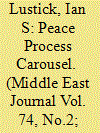| Srl | Item |
| 1 |
ID:
175427


|
|
|
|
|
| Summary/Abstract |
Following the 1967 Arab-Israeli war, the United States took a relatively passive approach to Middle East peacemaking. The passivity shown by the administration of President Lyndon Johnson stemmed primarily from its belief that the Arab states had failed to make reasonable proposals for an agreement and from the White House’s awareness that pressuring Israel would likely have significant domestic political consequences. Thus, even though it felt the need to press Israel to withdraw to prewar boundaries as part of a settlement, the administration made little effort to achieve an agreement on that basis.
|
|
|
|
|
|
|
|
|
|
|
|
|
|
|
|
| 2 |
ID:
175428


|
|
|
|
|
| Summary/Abstract |
This article examines the writings of Arab intellectuals on the ideas that inspired the Islamic State organization (ISIS) through a survey of Arabic-language books, scholarly articles, and editorials in leading newspapers during the group’s 2014– 18 heyday. This probe focuses on one broad, recurring question that permeated these writings: namely, what were ISIS’s ideational sources? In addition to shedding light on the rich perspectives that Arab authors offered on this question and the extent to which they disagreed, this article demonstrates how Arab intellectuals were united in their intense hostility toward ISIS.
|
|
|
|
|
|
|
|
|
|
|
|
|
|
|
|
| 3 |
ID:
175426


|
|
|
|
|
| Summary/Abstract |
More than 50 years of American diplomacy in the Arab-Israeli “peace process” have revealed it to be a carousel of constant activity with no forward movement. Despite chronic failure and embarrassment, it continues in great measure because of the cumulative effects of the influence of the Israel lobby in the United States, through cycles of opportunity, initiative, retreat, and compensation. Mathematician John Nash’s theory of an inefficient equilibrium is offered as an explanation for the still-sustained pretense of the possibility of a negotiated peace agreement and the conditions under which the peace process carousel could finally stop turning.
|
|
|
|
|
|
|
|
|
|
|
|
|
|
|
|
| 4 |
ID:
175430


|
|
|
|
|
| Summary/Abstract |
Scholarly works and public narratives dealing with the mandating of the veil in Iran in the aftermath of the 1979 revolution often focus on the coercive aspects of the process and emphasize the role of religious groups consolidating power. This article takes a closer look at how nonreligious leftist groups perceived and participated in the process. By revisiting the publications of seven prominent secular left-wing groups, this article discusses nuances in the Iranian left’s historic approaches to veiling and how these groups’ ideologies and political alliances shaped their responses to the quickly shifting gender politics of the post revolutionaryperiod.
|
|
|
|
|
|
|
|
|
|
|
|
|
|
|
|
| 5 |
ID:
175429


|
|
|
|
|
| Summary/Abstract |
By analyzing the interest displayed by the followers of Ayatollah Ruhollah Khomeini in writings by members of the Muslim Brotherhood, this article shows how the Shi‘i Islamist movement in Iran and Afghanistan was both transnational and influenced by Sunni Islamists in the Arab world. Using mostly Iranian and Afghan sources, this article discusses these influences through the notion of Islamic revolutionary ecumenism. While much attention has been given to Khomeini’s call to “export” Iran’s Islamic Revolution, this article shows some of the ways his own followers “imported” their ideology.
|
|
|
|
|
|
|
|
|
|
|
|
|
|
|
|